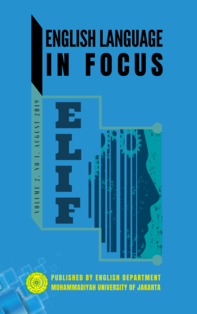Using Puppet Games in Teaching Speaking for Tenth Graders of Senior High School
DOI:
https://doi.org/10.24853/elif.2.1.1-8Keywords:
puppets, games, teaching speaking, students’ speaking skill.Abstract
This research aimed to improve the students’ speaking skill in English lesson by puppets games. This research was conducted by using Quasi-Experimental. The subject of this research was Class X MIPA of SMA Perjuangan Depok 2018/2019 academic year, which consisted of 29 students. The objective of this research was to teaching students’ speaking skill in English Lesson by using Puppets Games at Ten Grade of SMA Perjuangan Depok. The data were gathered through quantitative and qualitative data. The result of this research showed that there was increasing of students in speaking skill. The mean of pre-test was 58.34. The mean of post-test was 77. Based on the result analysis, it can be concluded that there was a significance using puppets games in teaching speaking at tenth grade senior high school. The result showed that the result of T-test calculation is 13.090 more higher than T-table 5%, it gained score 2.045. Therefore, it can be conclude that teaching speaking using puppets games is effective to improve speaking skill at the tenth grade of SMA Perjuangan Depok. The results of this study are expected to be useful to related parties such as principals, teachers, parents, students and further researchers.References
Blestein, T., & Lewis, M. (2015). One-on-One Language Teaching and Learning: Theory and Practice. Cambridge, UK: Cambridge University Pres.
Celce-Murcia, M., Brinton, D., & Snow, M. A. (2014). Teaching English as a Second or Foreign Language. New York: Heinle Cengage Learning.
Goh, C. C. M., & Burns, A. (2012). Teaching Speaking: Holistic Approach. New York: Cambridge University Press.
Hughes, R., & Szczepek Reed, B. (2017). Teaching and Researching Speaking. New York: Routledge.
Huyen, N. T. T., & Nga, K. T. T. (2013). Learning Vocabulary through Games: The Effectiveness of Learning Vocabulary through Games. The Asian EFL Journal, 5(6). Retrieved from https://www.asian-efl-journal.com/main-journals/learning-vocabulary-through-games-the-effectiveness-of-learning-vocabulary-through-games/#squelch-taas-tab-content-0-1
Kidspot. (2016). 14 Fun Puppet Activities For Kids. Retrieved from https://www.kidspot.com.au/things-to-do/art-and-craft/14-fun-puppet-activities-for-kids/image-gallery/138250ddf6d59441cc1a061cdc900b5a
Mayesky, M. (2011). Creative Activities for Young Children. Wadsworth Cengage Learning.
Narayanan, K. (2012). The Importance of Puppets. Retrieved from https://www.slideshare.net/kokilavaaninarayanan/the-importance-of-puppets
Richards, J. C. (2012). The Language Teaching Matrix. Cambridge: Cambridge University Press.
Wikipedia. (n.d.). Puppet. Retrieved from https://en.wikipedia.org/wiki/Puppet#Types_of_puppet_and_puppetry
Wright, A. (2013). RBT: Creating Stories With Children. Oxford University Press.
Downloads
Published
Issue
Section
License
Authors who publish with this journal agree to the following terms:
- Authors retain copyright and grant the journal right of first publication with the work simultaneously licensed under a Creative Commons Attribution License that allows others to share the work with an acknowledgment of the work's authorship and initial publication in this journal.
- Authors can enter into separate, additional contractual arrangements for the non-exclusive distribution of the journal's published version of the work (e.g., post it to an institutional repository or publish it in a book), with an acknowledgment of its initial publication in this journal.
- Authors are permitted and encouraged to post their work online (e.g., in institutional repositories or on their website) before and during the submission process, as it can lead to productive exchanges, as well as earlier and greater citation of published work (See The Effect of Open Access).


